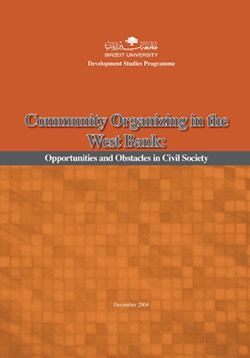
Sarah Jessup, Nader Said, Shahnaz Jubran
This Study investigates the types of local committees and voluntary groups organized to address community problems and hardships related to the events of current Intifada (starting September 2000) in three West Bank villages. The project was designed to explore how the destruction of infrastructure and economy was managed at the community level, and whether local groups, of the type found in civil societies, existed or were being formed to handle local issues including curfews, closures, unemployment, electricity and water problems, and shortages, to name a few of the most persistent break downs in the social structure during the Intifada.
Research showed that while there were many individual coping strategies employed, there were few large group efforts in operation, or few civil society-type grassroots support units initiated during the Intifada. Some smaller-scale groups did meet for mutual assistance. The range of these groups varied between villages, and related to the types of economies and the types of relationships with local governments and with local NGOs. It is theorized here that the reason for this lack of a unified wide-scale response has to do with the nature of the hardships in this Intifada, which were mainly economic, as well as problems in communication and transportation caused by the Israeli-imposed closure, which isolated the villages. Alienation and depression seemed common in the villages, and there was little energy to form community-wide responses. Several entrepreneurial projects were launched by individuals in the villages, but larger, coordinated efforts by local groups to address hardship were rare. An additional factor inhibiting group organization was the position of the Palestinian Authority (PA) and the role of the local governments, which while largely powerless, were nonetheless looked to by the local populations for expected support. In some cases, soured relations between local populations and these governments led to, or were exacerbated by locals’ blaming the public sector for its weak social services.
The emerging form of the PA was an important political, economic, and social background for this report. As the future Palestinian state is shaped and stymied by the Intifada, Palestinian society’s relationship to that public body is similarly developing, and expectations are forming about the role of government in community life.



Comment here